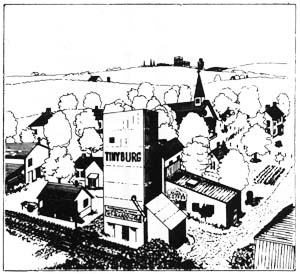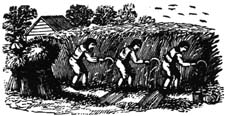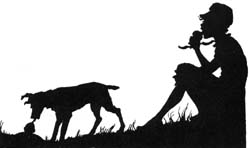|
|
|
|
. |
Tinyburg Tales
Bob Hastings
(In the last issue) Rhonda Spiller and her friends in the 6th grade classroom listened to stories of the Great Depression. Six senior citizens from the Tinyburg Church told the pupils what it was like in the 1930s. As the story continues, Aunt Sarah Biggs is reminiscing.)
Mr.Belford, the 6th grade teacher, asked Aunt Sarah how life changed during the Great Depression. She replied: "First thing, my parents looked for ways to save a dollar. If you couldn't make a dollar, at least you could save one here and there. We canceled our subscriptions to the "Tinyburg News" and the "Saturday Evening Post." Nearly killed me, for I loved to read, especially the comics-only we called them the 'funny papers.' "Daddy used grappling hooks to clean out an old well back of our house, then shut off the city water. That didn't save much, maybe $1 a month, but that was $12 a year, enough to buy more groceries than you could carry home in one shopping trip. "In the summertime, we heated wash water in a tub setting up on bricks, a fire underneath. Heated another big kettle where we boiled the white clothes to get them clean. "To save on detergent, Mother made soap from fat drippings. We poured the leftover sudsy water on our rose bushes. Mother said the suds killed the bugs. "For bath water in the sununer, we drew a tub of well water and let it set outdoors in the sun all day. By dark, it was warm enough to jump in and take a bath." "In front of the neighbors, with no clothes on? wondered one youngster. "Oh, we waited till dark, then put on our night clothes and ran inside and hopped in bed without turning on a light. "In the winter, we heated our water on the cook stove and washed our clothes in the house. Then we hung them out to dry. Never knew what an automatic washer or dryer was. Cold weather, the clothes would freeze. Ever see a big pair of bib overalls, frozen stiff, hanging on a clothes line? Looked like they were hanging someone. Rainy days, we hung clothes in the house, stretched lines all over everywhere. "Bet you never smelled the clean, moist fragrance of wet clothes drying inside! Tell you, that cleared out your nasal passages. Didn't cost hardly anything, either. No electrical or water bill. "Another way we saved money was taking care of ourselves. Had to -couldn't afford medicine and a doctor unless you were on your death bed. If we cut a finger, Mother stopped the bleeding with a cobweb. Used lots of Vicks salve and linaments for colds. Also soaked your feet in warm water while you drank hot lemonade. In the spring, Daddy dug up sassafras roots for hot tea. Supposed to thin your blood, get you ready for summer. For a dog bite or a boil, you applied a poultice of fat meat. And on and on. Mother knew a home remedy for everything, except for having babies. She just kept on having babies through the Thirties -loved everyone of them, too! " When it came Edith Barker's turn to talk, she said Aunt Sarah's description of drawing water from a well reminded her of their Depression-era "refrigerator." "h was our well," she said. "We couldn't afford to buy ice, and only a half-dozen homes in Tinyburg had electric refrigerators. So we lowered our eggs and other perishables down in the well in a bucket, where it was cool. The bucket also held our oleo, the poor man's substitute for butter. "You dunked your food under the well water?" asked one youngster. "Not in the water-just lowered the bucket almost touching the water, where it was cool. Oh, once in a while we'd buy a chunk of ice from the ice man. Put a black and white ice card in the front window, so he'd know if we wanted 25 pounds or whatever. "In the hot summer, it was a treat to afford a chunk of ice, keep it under the house, wrapped in burlap and old quilts to protect from melting. We made iced tea, lemonade, and sometimes ice cream. "How careful we were with that ice -made it last and last. After freezing ice cream, we washed the salt off the leftover ice, then used it again for tea or ice water. "In the winter, we made snow ice cream. This was the cheapest way, for you didn't need ice or salt. While the snow was fresh and clean, you scooped up a dishpan full, then mixed fresh eggs, milk, sugar, and vanilla extract. What fun to sit around the stove eating snow ice cream out of a big vegetable bowl, while the cold wind blew outside." Now it was Clay Barker's turn: "The reason you could survive on so little money during the Great Depression was you didn't have many of the expenses we face today. Take air conditioning. We never heard of it, so we had no repair and electric bills. "After supper, during the summer, neighbors sat outdoors in porch swings or lawn chairs, while the kids played 'release' in the shadows or 'kick-the-can' under the street lights. Too hot to sit indoors, and there was no TV to entice you. "Around suppertime, everybody tuned their radios to 'Amos 'n Andy,' a popular show for many years. If you were coming down the sidewalk, you could almost keep up with the story as you passed house after house. With the doors and windows the sound carried easily. "This not only saved money, but it got people outdoors where they met their neighbors, talked and visited until bedtime. You don't see that today everyone's shut up inside with the TV and air conditioner going full blast. Folks made it through the Depression, because they could talk and share their worries. Somehow, your unpaid bills and empty wallet didn't seem so bad when your neighbor said he was in the same fix."
The last speaker in the 6th grade class was S. Franklin Rodd, now 70 years of age, who's lived all his life on the farm where he was born: "Looking at the nice clothes you kids are wearing reminds me of how we dressed in the 1930s. Part of it was custom, and part because we couldn't afford better. I notice your clothes fit nicely. You should be glad. When I was a boy, you never bought anything to fit-it was always bigger, so it would last longer and you could 'grow into it.' "My mother, who had a sewing basket big as an oversize watermelon, was always taking up or letting out, or else sewing on patches. And when you outgrew a pair of jeans or a sweater, you passed it on to the next kid. Pity the youngest-he seldom got anything new. "As a farm boy, I never heard of pajamas. In the winter you slept in your un erwear, in t summer maybe nothing. And how can I forget those long, cotton stockings in the winter, pinned to my underwear legs? "We never threw away a pair of wom-out socks with holes in them or a threadbare sweater. Mother cut our old clothes into strips, sewed those strips together which she rolled into balls, then braided them into rugs. Or she cut up old dresses and shirts and made quilt scraps, which she pieced together for quilt tops. "As soon as the dandelions bloomed, we went barefoot-not only because we begged to, but because we couldn't afford new shoes in the summer. At first, the bottoms of your feet were so tender you winced when you walked on cinders or gravel. By late June, you could run on the roughest ground, your soles were so hardened. I never remember getting my feet clean in the summer. The dirt was ground in-maybe by Christmas they came clean! Summer mornings, I liked to run through the grass and feel the wet dew between my toes." Then he quoted John Greenleaf Whittier:
The 6th graders asked two final questions: "Would another Depression be good for our country?" Uncle Billy quickly answered, "I'd never bring back the despair of the 1930s. Enough people are homeless and jobless as it is. However, I do long for some of the old-fashioned neighborliness of those hard, hard times." The second question: "What do you miss most from the 1930s?" Clay Barker volunteered: "I miss lots of things from my boyhood, so it's not easy to narrow the list to one thing. But to me, I have a lot of nostalgia for the old-time five and ten-cent store, commonly called the dime store. "They were called dime stores because you could buy hundreds-maybe thousands-of items for a nickel or a dime. A boy could walk in one of those stores with a little change in his pocket and come out with a sackful of goodies. "I can't begin to list everything. I remember the long, glass case of bulk candy-lemon drops, orange slices, peppermint sticks, chocolate drops, peanut butter logs, red and black licorice, chocolate-covered peanuts, jelly beans, horehound, caramels, red hots, and coconut bars. "And the school supplies-notebook paper, tablets, crayons, bottles of white paste, bottles of ink, pencils, rulers, and scissors. Also sewing materials for women-needles, pins, thread, lace, dress material, buttons, and belt buckles. "For the home there were picture frames, towels, pots and pans, combs and brushes, dishes, glasses, nuts, bolts, screws, and small cans of enamel paint in a hundred shades. Girls could buy perfume, hairpins, mirrors, and lipstick. Mothers could buy socks, handkerchiefs and gloves for their children. And on and on. "Sure, you find all these-and more-in the big discount stores. But there was something magic about the old-time dime store with the hundreds of low-priced items, the wooden floors smelling of pine oil and scented floor sweep. And ice cream sandwiches with three flavors in one: chocolate, vanilla, and strawberry." The dismissal bell interrupted and Clay sat down. How Mr. Belford's 6th graders had enjoyed two days of storytelling from the Great Depression! As they picked up their books and filed outside, one boy whispered to Clay, "I wish I'd been bom-ed earlier. You kids had all the fun!"
Bob Hastings' radio program, "Tinyburg Tales," is aired on more than 50 stations in 14 states. He also gives story programs for civic clubs, churches, and schools. He lives at 98 Laconwood, Springfield, IL 62707. Telephone (217) 529-1086.
|
|
. |
|
|
|
|





